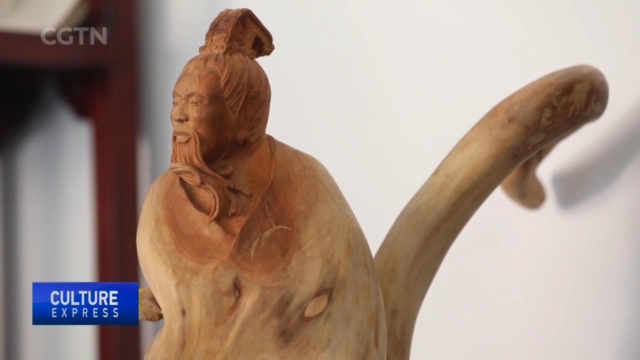
19:10, 07-Jun-2019
Intangible Cultural Heritage: Woodcarving master tells story of ancient patriot through carving
Updated
00:01, 10-Jun-2019
02:40

As we mentioned earlier in the show, Zigui County in central China's Hubei Province is the birthplace of Qu Yuan, the patriotic icon commemorated by the Chinese for thousands of years. Zigui is also home to some 500 intangible cultural heritage inheritors. The ancient town's rich cultural history is filled with the development of many handicraft and performance arts. CGTN's Zhao Yunfei visited a woodcarving master who says his destiny is tied to Qu Yuan.
Qu Yuan, a spiritual figure that many Chinese people remember during the Dragon Boat Festival. He is a patriot and poet who lived in 300 BC. Nobody knows what he looked like. But 42-year-old Liu Zhihua has been carving the ancient's statue since he was young.
LIU ZHIHUA INTANGIBLE CULTURAL HERITAGE INHERITOR, YICHANG CITY "Qu Yuan was very slim, according to records in historical documents. I can't carve him too fat like me. He was a little arrogant but also had integrity."
Born and raised in Zigui County in central China, Liu hails from Qu Yuan's hometown. The patriot served as national defense minister to Emperor Zhou. He was martyred after the dynasty perished. Liu says the older he grows, the more he understands Qu Yuan's situation. He puts his emotions into the artistic creations.
LIU ZHIHUAINTANGIBLE CULTURAL HERITAGE INHERITOR, YICHANG CITY "Each of my finished pieces differs from the others. That's the beauty of handicraft. Unlike machine carving, they are all the same."
Liu's store is located in an ancestral hall of Qu Yuan, a tourism site for visitors to come and pay tribute. Woodcarving is an intangible cultural heritage. Liu hopes more people can learn of Qu Yuan's spirit through his work.
ZHAO YUNFEI ZIGUI COUNTY, HUBEI PROVINCE "On this street right outside a popular tourist attraction, people are drawn to the intangible cultural heritage products simply by seeing them, learning about them or even tasting them. It's a method the local government is taking to brand the town."
YAO WEIJUN PROFESSOR, SCHOOL OF HISTORY AND CULTURECENTRAL CHINA NORMAL UNIVERSITY "In the past, many people thought that western civilization was more advanced. Now, by learning about Chinese intangible cultural heritage, people realize that our own culture is also rich. It can increase people's confidence in their own culture."
To that effect - many Chinese art performances have gone on stage in various communities. Artists vow for protective measures on folk culture to prevent their extinction. Many say the best way to keep them alive is through effective education and promotion. Zhao Yunfei, CGTN, Zigui County, Hubei Province.

SITEMAP
Copyright © 2018 CGTN. Beijing ICP prepared NO.16065310-3
Copyright © 2018 CGTN. Beijing ICP prepared NO.16065310-3